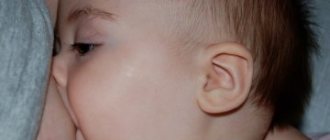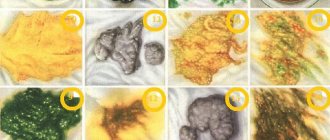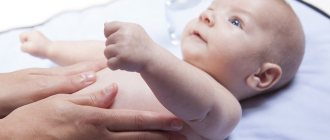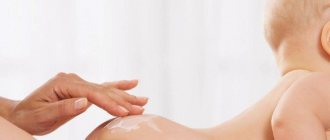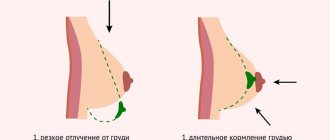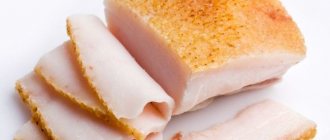After a baby arrives in the family, his health status becomes one of the priority issues for parents. Therefore, they monitor the color, consistency and smell of the child’s stool. Changes in basic stool parameters are often one of the symptoms of many diseases. At the same time, you should not panic when you detect any changes. Sometimes they are completely physiological and understandable. Let's look at the main reasons for changes in the condition of a baby's bowel movements, and how to collect feces from a child for analysis.
Causes
Fats (lipids) from food are digested in the intestines under the action of the enzyme lipase, produced mainly in the pancreas. Congenital lipase deficiency sometimes occurs , but in newborns this deficiency is more often temporary, associated with immaturity of the pancreas . As a result of this immaturity, the production of enzymes, including lipase, is insufficient. This deficiency occurs especially often in premature infants and children with intrauterine growth retardation.
Meanwhile, nature has foreseen this situation and provided babies with reliable insurance: breast milk contains lipase, which facilitates the digestion of fats. However, if the baby is formula-fed, pancreatic lipase immaturity may manifest itself clinically.
In addition to lipase, a certain composition of bile is required for the digestion of fats, so disorders of fat metabolism can also be observed in children with diseases of the liver and biliary tract . Such diseases are characterized by not just fatty, but also lighter-than-usual stools.
Foamy stool
Watery, foamy stools with an unpleasant odor indicate lactase deficiency. Breast milk contains a milk sugar called lactose. To digest lactose, a special enzyme, lactase, is secreted in the child’s body. If the baby's lactase production is insufficient, the milk sugar in mother's milk is difficult to digest. Milk sugar is a carbohydrate that attracts large amounts of water into the intestines. The fermentation process produces watery, foamy stool. Lactase deficiency is also observed in cases where the mother's milk contains a large amount of lactose or the mother simply consumes too many dairy products.
Loose stools in newborns during breastfeeding indicate an acidic environment in the intestines due to lactase deficiency. Increased acidity prevents the formation of normal intestinal microflora.
If you suspect lactase deficiency, you need to take a stool test for carbohydrates and coprogram. If the diagnosis is confirmed, the nursing mother will first have to adjust her diet: reduce the consumption of dairy and fermented milk products.
As the child grows and his digestive system matures, the production of enzymes will regulate. Around the end of the first year of life, lactase deficiency resolves on its own.
Diagnosis and treatment
If a child has fatty stools, which is accompanied by constipation or diarrhea, a pediatrician or pediatric gastroenterologist will first rule out problems with fat digestion. For this purpose, a scatological examination is prescribed (i.e., stool examination), and the condition of the liver and pancreas is checked (ultrasound, biochemical and immunological studies).
In difficult cases, the child is examined in a hospital. Children are given a diet and medications containing pancreatic enzymes and bile acids. Treatment is prescribed only by a doctor, since the composition and effectiveness of enzyme preparations are different, and there are certain indications and contraindications for them.
Celiac disease
One of the most serious causes of fatty stools is celiac disease.
Celiac disease is a genetic disease in which, due to enzyme deficiency, the absorption of a substance called gluten is impaired. Gluten is found in many grains and is included in many foods. When consuming such products, toxic products of incomplete breakdown of gluten accumulate in the body of a patient with celiac disease, which damage the mucous membrane of the small intestine. This damage is accompanied by impaired absorption of proteins, fats and carbohydrates, and the development of the so-called malabsorption syndrome.
As a rule, symptoms of celiac disease first appear in children some time after the introduction of cereals (semolina, oatmeal and other cereals) into the diet. This causes diarrhea and fatty stools. Such children grow poorly and gain weight, becoming capricious and irritable. Over time, symptoms of rickets may appear.
Celiac disease treatment
The main treatment for celiac disease is a diet completely eliminating foods containing gluten. All grains should be excluded from the diet, except rice, buckwheat, corn, as well as products that may contain them, including sausages, sausages, and some canned food. Usually the diet is supplemented by eliminating lactose and allergens.
Children 1 year of age may be prescribed soy formulas or formulas based on casein hydrolyzate.
In case of celiac disease, adherence to the diet should be lifelong, since departure from it is not only fraught with a possible exacerbation of the process, but significantly increases the risk of developing malignant neoplasms, including intestinal lymphomas.
Strict adherence to the diet with timely initiation of treatment helps ensure the normal development of the child. In case of strict adherence to the diet and adequate additional therapy, children with celiac disease do not lag behind their peers in either physical or mental development.
Production editor - Galina Filippova
Source
What to do if a child has fatty diarrhea
Diarrhea often occurs with indigestion in children of the first year of life, especially in the summer, but loose stools are not a separate disease, it is a symptom of various diseases or disorders. You might think that diarrhea will go away on its own in infants and nothing will happen, but every year about five million children die from diseases accompanied by loose stools.
To determine whether a child has diarrhea or just soft stools, you need to observe him; with diarrhea, the child will have loose, uncontrollable diarrhea and a desire to empty the intestines as quickly as possible. It is not always possible to speak of diarrhea based on the number of bowel movements in a child, since breast-fed infants have bowel movements up to six times a day, and bottle-fed infants have bowel movements up to four times a day. Normal feces in a breastfed baby will be in the form of a homogeneous porridge-like consistency, most often yellowish in color, and when fed with formula it will be dark and denser. After the introduction of complementary foods, the child's stool becomes less frequent and, as a rule, becomes more or less formed.
Causes leading to diarrhea
Currently, the most common cause of loose stools, especially in infants, are viral diseases - adenovirus, rotavirus. The virus can cause illness both in summer and in winter; such outbreaks often occur in a hospital or in a children's group. Parasites are also one of the causes of digestive upset, especially Giardia, Cryptosporidium, Microsporidia and others. From taking medications, a child may develop dysbiosis, which often manifests itself as diarrhea. If a baby has lactase deficiency, after drinking milk, the condition worsens, pain appears in the tummy, rumbling occurs and diarrhea occurs. If a child has sugar deficiency, then indigestion occurs after eating foods with added sugar. Babies have enteropathic dermatitis, which begins to appear after stopping breastfeeding, the child begins to lose weight, hair becomes brittle and falls out, stools are usually liquid and greasy, and are difficult to wash off; the same symptoms also occur with a lack of zinc in the body. If a child is over a year old, he may develop irritable bowel syndrome, which also affects the functioning of the digestive tract. Diarrhea can be one of the signs of ulcerative colitis, Crohn's disease, and chronic liver damage.
How to accurately determine the cause of the disease
At the first visit, the doctor palpates the abdomen. When you press on it in the lower left part, you can hear a rumbling sound, the sound of iridescent liquid.
After the examination, the following types of diagnostics are prescribed:
- Rectoscopy is an examination of the rectum with an endoscope (up to 30 cm). Allows you to identify swelling, atrophy, ulceration of the intestinal mucosa.
- Colonoscopy is a complete examination of the intestines. Allows you to identify pathologies in all areas.
- Biopsy is the removal of affected organ cells for examination. Allows you to confirm or exclude cancer.
- Coprogram (stool microscopy) allows you to identify drops of fat and fatty acids in the stool and determine at what stage the disease is.
- Ultrasound of the digestive organs. Identifies pathologies of internal organs.
- MRI is used if ultrasound examination turns out to be uninformative. Allows you to identify any pathologies and neoplasms.
- A blood test shows an increase in leukocytes and ESR. This is typical for this disease.
The doctor determines what type of diagnosis to prescribe depending on the suspicion of a particular pathology.
Fat stool
It is feces that leave greasy, shiny stains on diapers, clothes, and are difficult to wash off the walls of the toilet. Fatty stools occur with diarrhea and with constipation, too, and occur due to improper absorption of fats. Congenital lipase deficiency, which is usually temporary in newborns due to an immature pancreas, leads to impaired digestion of food in the intestine. Typically, such a deficiency occurs in premature babies or with abnormal intrauterine development, as well as in infants who are fed artificial formula. Bile also plays an important role in the digestion of fats, and therefore, in case of diseases of the biliary tract or liver, the feces in children of the first year of life become shiny and light in color.
During the examination, the pediatrician first rules out improper digestion of fats and prescribes a scatological examination of stool, ultrasound of the liver and pancreas, a biochemical blood test, and an immunological examination. Children with severe illness are placed in a hospital for observation, where they undergo all the necessary manipulations and select the appropriate diet and medications, which include the necessary enzymes and bile acids. When prescribing them, the pediatrician takes into account all the indications and contraindications in order to cure the child.
Celiac disease
This disease is manifested by digestive disorders due to improper absorption of fats and carbohydrates in the small intestine. Celiac disease develops with intolerance to the protein of wheat, rye and oats, so the first manifestations begin after the introduction of cereal porridges into the child’s diet.
The disease usually occurs at the age of two to three years; children develop weakness, lethargy, are irritable, tearful, lose appetite, the skin becomes pale, muscle weakness, anemia, and exhaustion develop.
Patients develop poorly physically, are stunted, osteoporosis, rickets appear, and nails take the shape of watch glasses. The teeth darken, caries appears, the stomach becomes large, as excess fluid appears in the dilated intestinal loops, the so-called pseudoascites, and increased gas formation is noted. The stools become light, shiny in color, the stool is frequent and contains a large amount of neutral fat. As a result of this disease, children in the first year of life develop multivitamin deficiency, hypoproteinemia, there may be edema, and the content of essential minerals in the body decreases.
Diagnosis and treatment of celiac disease
In case of celiac disease, a number of specific antibodies are isolated, which are detected using clinical diagnostic studies. Diagnostic value of serological markers:
- antibodies to alpha-gliadin of the IgG class are nonspecific, but highly sensitive up to 95%, and IgG antibodies have a low sensitivity of about 40%;
- the study should be done only with new tests with improved characteristics for detecting antibodies;
- antibodies to TkTG of the IgG and IgG classes are highly sensitive, but they are not specific;
- antibodies to reticulin occur in 40% of patients;
- titers of all autoantibodies decrease when following a gluten-free diet.
Treatment begins with the agliadine diet, which consists of eliminating foods containing rye, oat and wheat flour from the diet, and also reducing the amount of fat and starch. For treatment, vitamins are prescribed in large doses, enzymes to improve the functioning of the pancreas, iron and calcium supplements, anabolic steroids, enterosorbents, and therapeutic massage and gymnastics are also prescribed. If a gluten-free diet is not followed, oncological pathologies may develop in the future, so early diagnosis and adequate treatment are necessary.
Acute diarrhea
It usually occurs in children due to failure to comply with personal hygiene rules, licking dirty hands, playing with animals, or drinking unclean water. The cause is most often viruses or bacteria that lead to indigestion; it usually goes away within a few days on its own, but there can be complications. The incubation period for acute infection lasts from two hours to 10 days, the first manifestation is fever, diarrhea and abdominal pain. There may be intestinal colic, blood clots or mucus in the feces, sometimes nausea and vomiting occur, which without treatment leads to dehydration; in severe cases, damage to the meninges and lungs occurs, sometimes joint function is impaired, and rashes appear on the skin. If frequent vomiting occurs, then you need to consult a doctor, since in children of the first year of life, when dehydrated, a state of shock quickly develops, you need to start replenishing the lost fluid as early as possible, that is, you need to drink saline solutions, and the baby should urinate enough. At home, you can give adsorbents that remove toxins from the body; the food should be gentle and well digested by the intestines (soups, baked potatoes, rice).
Before calling the doctor
Before the doctor arrives, it is necessary to leave one contents of the potty or diaper so that the doctor can quickly establish the correct diagnosis. After each act of defecation, it is imperative to wash the baby to avoid skin irritation; it is advisable to lubricate it with baby cream after washing. At home, medications for diarrhea can only be used after a doctor’s prescription, as it can cause even more harm. At high temperatures, antipyretic medications are given, the dose of which depends on the age of the baby. It is necessary to think about what could cause discomfort in the tummy, maybe from some food or new complementary foods, if this is a violation of an allergic manifestation, then after stopping a certain product everything will recover on its own within two to three days. When diarrhea occurs due to a cold or runny nose, you must first get rid of the disease.
With vomiting and diarrhea, dehydration develops, the degree of which can be determined at home by the condition of the baby, by the dryness of the mucous membranes and skin and the number of urinations. Lost fluid must be compensated with saline solutions, and if the condition worsens, hospitalization in a hospital is required.
Errors in food
Often, bowel dysfunction occurs due to poor nutrition, especially at an early age, when eating various sweets, canned juices, fried foods, and excessive consumption of fruits and vegetables. Intestinal upset can also develop from incompatible foods or from excess food eaten, especially after the holidays.
With frequent travel and transfers, digestive disorders may occur due to changes in climate, water, and food, the so-called traveler's diarrhea. In children of the first year of life, it can be accompanied by abdominal pain, vomiting, a slight increase in temperature, all this goes away after adaptation to new living conditions; to tame it, you can use enzymes, drugs to normalize stool, antipyretics, and drugs that normalize intestinal motility.
Infants often suffer from eating disorders (dyspepsia), which occurs when the volume and composition of food for the first year of life does not match, that is, the baby is overfed, resulting in diarrhea, regurgitation and even vomiting. To eliminate such manifestations, you need to restore the correct daily routine and diet, reduce the amount of food consumed or replace it with more digestible products.
Other baby stool problems
Not only the color and consistency of baby stool, but also its heterogeneity or the presence of lumps or mucus can frighten a young mother.
- White curdled lumps Undigested, curdled pieces or flakes indicate that the child is overeating. The newborn’s body is designed in such a way that excess food is not digested and leaves the body. This is especially true for babies who receive breastfeeding on demand. If the child is gaining weight and feels well, then there is no need to worry. But if his health worsens, or the child loses weight, then it may be an enzymatic deficiency. Then the mother should consult a doctor to prescribe enzymes.
- Mucus A small amount of mucus in the stool is considered normal in both adults and children. But you need to know that during the inflammatory process in the body, the amount of mucus in the body increases. The cause of an increase in mucus in the stool can be a cold, intestinal infection, atopic dermatitis, lactase deficiency, or allergies.
- Blood The presence of blood in the baby's stool should alert the mother. The cause of this phenomenon can be either a harmless drop of blood from cracks in the nipples or more serious pathologies in the baby’s body: anal fissure, inflammation of the intestines, dysbacteriosis, allergy to cow’s milk protein, lactase deficiency, infectious intestinal diseases.
Lactase deficiency
It occurs when there is a lack or absence of an enzyme (lactase breaks down milk sugars) in the intestines and lactase deficiency can be congenital, that is, inherited and acquired, after various infectious diseases or allergic manifestations, due to the use of medications (antibiotics, hormonal agents) .
Another type is temporary lactase deficiency, which develops due to intestinal immaturity and goes away over time. Foaming diarrhea with a sour smell, bloating, rumbling, colic, frequent regurgitation and vomiting appear, as a result of which body weight decreases; the diagnosis is established when a large amount of carbohydrates is detected in the stool. It is necessary to replace dairy products, or, along with drinking milk, to give special enzymes with lactose, which promote the digestion and absorption of lactose in milk. After starting this treatment, all symptoms gradually disappear and body weight begins to increase. For babies in the first year of life on artificial feeding, there are special lactose-free formulas, but in the first year of life on natural feeding there is no need to switch to such formulas, you just need to give enzymes along with feeding.
Prevention of intestinal disorders
Children's nutrition should be correct and balanced, only proven and fresh products should be used, vegetables and fruits should be thoroughly washed before consumption. Be sure to wash your hands before each feeding, monitor the cleanliness of toys, especially those that the baby puts in his mouth; if you have allergies, you must make sure that the allergen does not enter the body.
Normal stool
The nature and frequency of normal bowel movements in a breastfed baby depends on the individual characteristics of the body, but on average they have the following indicators:
- Frequency up to 8 times a day when breastfeeding;
- Feces should not contain mucus, lumps of food, and be homogeneous.
If there are greasy stains from feces on the diaper or diaper that become soapy when washed, it means that there is some kind of disorder in the baby’s body and an examination and qualified treatment is necessary.
When to see a doctor
A baby's stool is an indicator of his health. In most cases, breastfed babies do not have digestive problems. Temporary difficulties associated with the formation of the digestive system pass on their own. But still, in some cases, parents should be vigilant and consult a doctor.
These situations are described below:
- if stool less than once a day on mixed feeding;
- if the stool is dense, plasticine, reminiscent of goat nuts;
- poops only after an enema or gas tube;
- profuse and frequent regurgitation;
- pain during bowel movements.
If a pathology is suspected, the doctor will prescribe a stool coprogram test. Based on the results of the study, it will be clear how the processes of food digestion proceed in the intestines, hidden blood is revealed, and signs of dysbiosis are detected.
An exclusively breastfed baby's stool can be anything within the options described. The determining role is played by the child’s well-being, his age, and how he gains weight.
Causes of fatty stools in children
There are several main reasons why a child has oily, greasy stools:
- Impaired absorption of fats in the intestines due to congenital deficiency of the lipase enzyme.
- Fatty stools in infants can occur in premature babies with insufficient development of pancreatic functions.
- On artificial breastfeeding, the baby does not receive enough lipase (it is found in abundance only in breast milk).
- Impaired fat metabolism and biliary tract dysfunction.
- Celiac disease is an allergic disease that interferes with the absorption of gluten. Celiac disease has a genetic hereditary predisposition.
Fat in a child’s feces most often forms immediately after the introduction of cereal complementary foods into the diet. When fat appears in a baby's stool, it slows down in growth and weight gain, tearfulness and irritability occur.
Liquid stool in a child
Infants are fed breast milk or infant formula. In addition, the intestinal microflora during this period of life is not yet fully formed. All this leads to the fact that most often in children under the first year of age, the stool has a runny consistency. Normally, it is believed that if a baby feeds exclusively on breast milk, his stool should resemble sour cream in consistency. Children who are mixed or bottle-fed have stools that are more reminiscent in appearance to the stool of an adult.
Other reasons
However, sometimes parents are faced with a sudden appearance of liquid stool in their child. The causes of this phenomenon may be the following conditions and diseases:
- Teething. Diarrhea especially often accompanies the eruption of the first tooth or fangs. The process of teething is also indicated by such signs as the child’s restlessness, increased drooling, swollen gums at the site where the tooth appears, and the baby’s desire to put everything in his mouth.
- Errors in child nutrition. Diarrhea can occur when the baby is overfed, complementary foods are introduced incorrectly, or if the baby's mother suddenly changes her diet.
- Viral or bacterial intestinal infection, food poisoning or parasitic infection. In this case, in addition to loose, frequent stools, the child develops an unpleasant smell of feces, nausea, vomiting, increased body temperature, and a deterioration in the general condition.
- Lactase deficiency, intestinal dysbiosis. If a child suffers from these diseases, he will experience bloating and weight loss against the background of constant diarrhea.
Classification
Based on the causes and nature of the disease, fatty stools in infants have several main types:
- Pancreatic diarrhea occurs due to pancreatic dysfunction and lack of lipase.
- Intestinal steatorrhea occurs when the intestinal mucosa is damaged and the process of absorption of beneficial elements is disrupted.
- Food diarrhea is caused by the inability to digest excess fats.
Depending on the nature of its manifestation, diarrhea can be of three types:
- Neutral fats are present in feces.
- The presence of soaps and fatty acids in bowel movements.
- Mix the type of acids in the stool.
What is steatorrhea
Steatorrhea is the release of fat from the human body along with feces. Fatty acids entering the human body are absorbed by 98%. If this does not happen, pathology of internal organs or excessive consumption of fatty foods is suspected.
The digestive system simply cannot cope with so many fatty acids. If a baby has fats or soap in their stool, a problem with the pancreas is suspected.
Another reason may be excessively fatty breast milk.
Diagnosis of causes
When fat is observed in a child’s stool, it is necessary to contact a gastroenterologist, who will first of all rule out a violation of the digestion of fats as the cause of the disease. For this purpose, a set of primary studies is prescribed:
- Study of feces (scatological analysis);
- Liver check;
- Examination of the pancreas;
- Immunological analysis;
- Biochemical tests;
- Ultrasound.
Most often, tests for fatty stool in breastfed infants are carried out in a hospital setting.
How to properly collect stool from children for testing
First of all, it should be noted that it is impossible to collect feces for research after a rectal suppository or enema.
If the child is already using the potty, collecting his stool is not difficult. The main thing is that before the baby goes to the potty, wash the potty itself thoroughly with baby soap. Cleaning agents must not be used under any circumstances. It is convenient to collect feces in a special container designed for this purpose, which has a convenient spoon attached to the lid.
But how to collect stool from a child who is not yet using the potty? The easiest way in this case is to collect feces from a diaper; a regular diaper from a diaper is especially suitable for this. If the baby’s stool is liquid, you can use medical oilcloth, from which the stool is then poured into a container.
To obtain reliable analysis results, it is important to observe the time that must pass from the moment the material is collected until it is submitted to the laboratory. The doctor referring the child for testing must report this.
Treatment of fatty stool in a child
Therapeutic measures are aimed not only at combating symptoms; in order to eliminate diarrhea, it is necessary to identify the cause and treat it.
Drug therapy
The basis of therapy is taking lipase drugs to improve the functioning of the digestive system:
Additionally, the newborn will take antacid medications:
These appointments are aimed at neutralizing the effect of gastric juice.
Enzyme therapy helps to effectively treat fatty diarrhea in children. Qualified specialists prescribe for children:
- Oral intake of hydrochloric acid;
- Intravenous administration of cortisone and adenocorticosteroids.
When observing fat in a baby's stool, in addition to therapeutic treatment, it is necessary to maintain a dietary diet and include foods rich in complete proteins.
